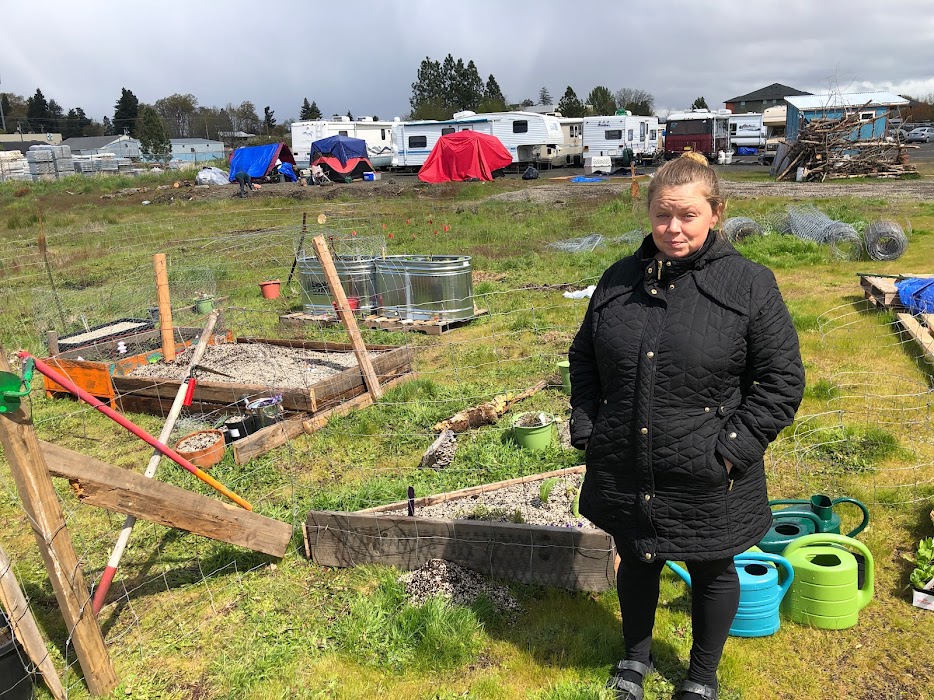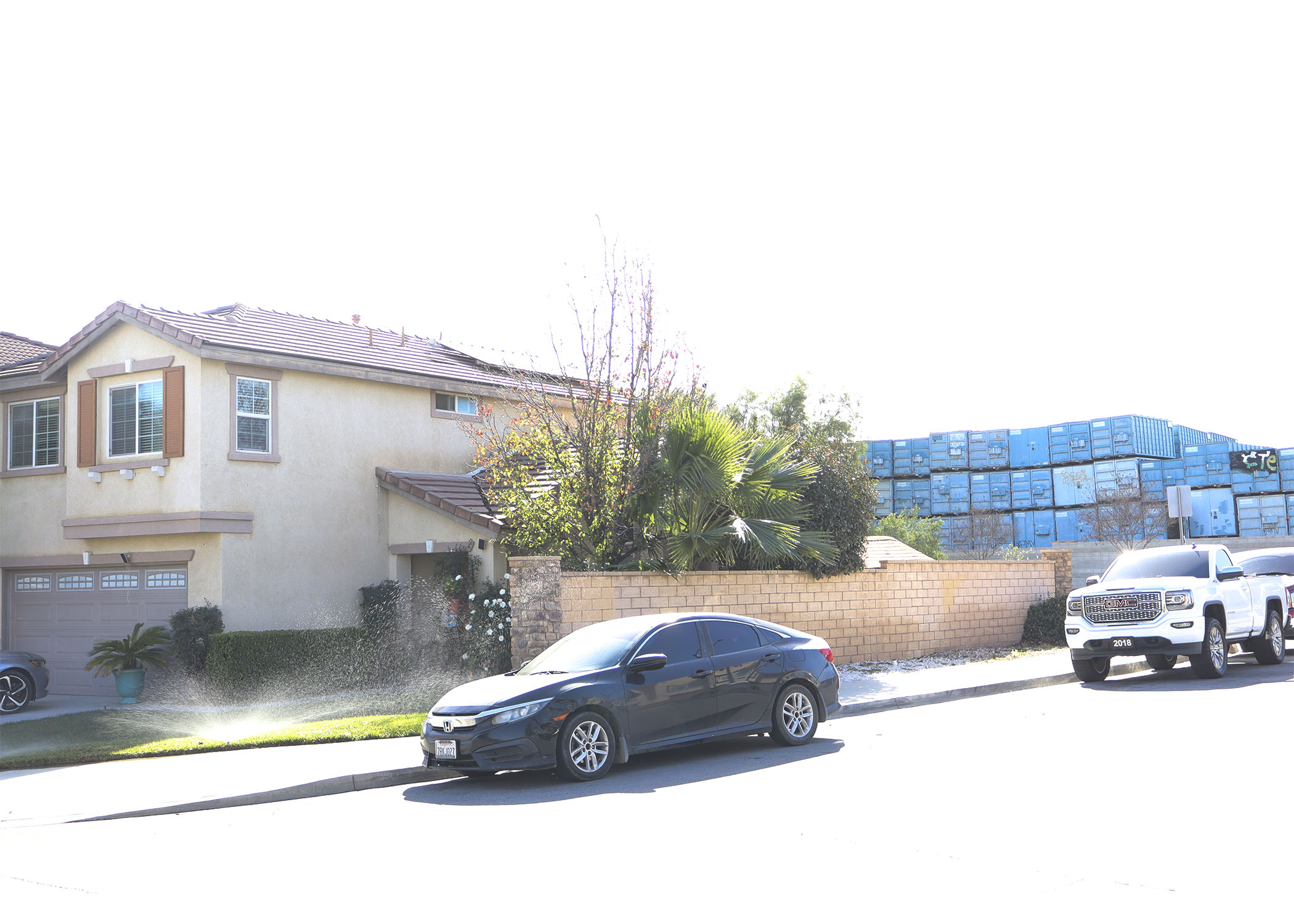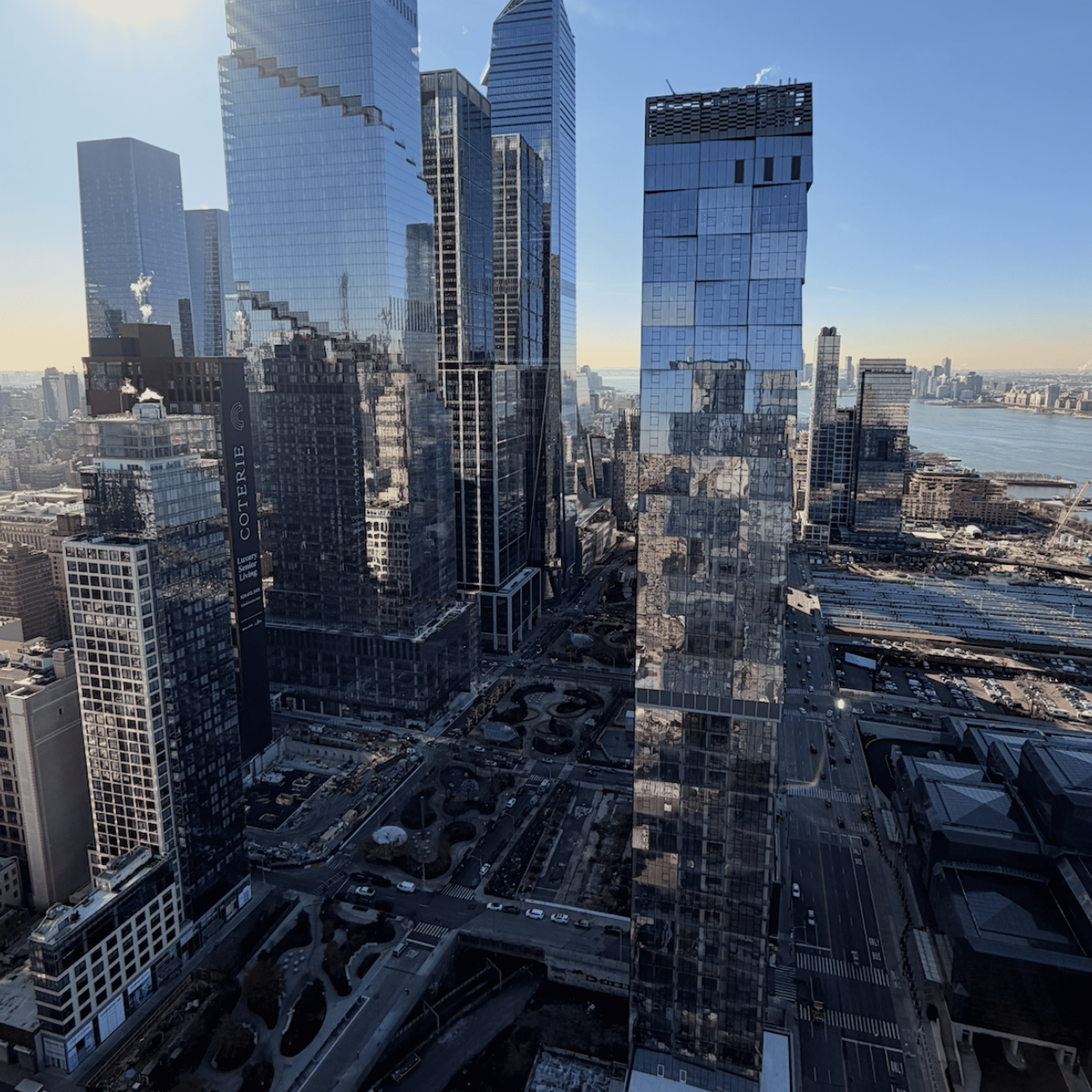(EUGENE, Ore.)—Elizabeth Diamond Deffenbaugh was looking for a way off the cold, damp streets of Eugene. By 2021, unable to meet renter qualifications and contending with PTSD and physical disabilities, the 33-year-old had been living in a tent near a dog park shadowed by the University of Oregon’s Autzen Stadium for years.
“It’s just kind of been an ongoing issue in my life,” said Deffenbaugh, recalling her childhood. “I grew up in foster care and ran away from that, and just kind of traveled around with hippies so didn’t really have a home, a stable home. Ever.”
On top of that, Deffenbaugh says she often felt harassed by city workers and Eugene Police officers, who forced her to relocate at times, and ticketed her if she didn’t comply quickly enough.
“Under the guise of checking up on you and making sure you’re safe, for just intimidation, basically.”
But things are different now. In February, Deffenbaugh escaped that chaotic existence on the streets. She’s among the early wave of residents to settle in Everyone Village, which began opening up spaces in late October 2021. The 3.5 acre facility is a “safe sleep” site, with a warehouse converted into a monitored checkpoint area and gathering space.
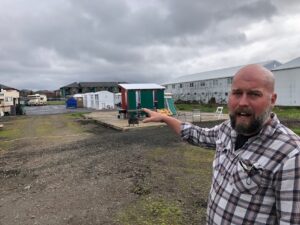
In this photo taken in March 2022, Everyone Village lead Gabe Piechowicz points to an area that will be filled in with additional shelters or RVs to accomodate unhoused residents. [Credit: Brian Bull]
“After working with community partners we have a site-plan that will have up to 100 (units/spaces),” said Gabe Piechowicz, village leader. “With a reworked Safe Sleep Site contract we are approved for up to 100 units. And through our partnership with the City of Eugene, we will be adding bathrooms and showers, community kitchens and other useful facilities so that we can support a larger population.”
Residents go through an application process, and there are restrictions they must abide by while living on the premises.
“We are intentional and cautious in our vetting process to make sure that everyone is a good fit for the community,” said Piechowicz. “We explicitly allow tobacco and cannabis, but all other substances are not allowed in our community.”
Piechowicz is also a pastor with Everyone Church. He helps lead spiritual services for those who want, but emphasizes that while he leads from the position of a Christian pastor, that he’s “happy and excited” to help everyone in their journeys, even if “those might be on different paths.”
That same respect of individuality is demonstrated by the fact that there is no timetable for residents to transition from Everyone Village into more self-sustaining situations, such as affordable housing, education, and employment.
“It’s so individual, just like any human story,” said Piechowicz. He says they’re pioneering a process where they tailor a plan to each resident’s goals and dreams. “And so each one would have its own unique timeline.”
Local officials have shown their support for Everyone Village’s mission and development. Kelly McIver, spokesperson for the City of Eugene’s Unhoused Response, said they’ve invested $170,000 in site development funding, with an additional commitment of $364,000 per year in operating expenses. The first investment helped with the facility’s infrastructure costs, including electricity and fencing, while the second allocation will help provide at least five full-time employees and cover basic services, including garbage pick-up and porta-potties.
But a good portion of the investment that built the village were one-time federal funds from the American Rescue Plan Act of 2021. McIver says that how the city will approach funding going forward is unclear.
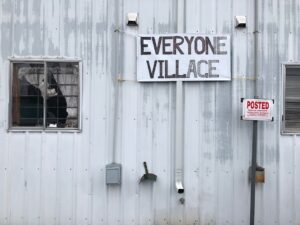
The front exterior of Everyone Village, with an office window and sign. [Credit: Brian Bull]
In fact, according to city and business officials, the entire process has been a collaborative venture between the non-profit sector and business community, stoked greatly by Piechowicz’s boundless enthusiasm. During the Eugene Chamber of Commerce’s latest annual economic summit, its CEO and president, Brittany Quick-Warner, closed the event praising Everyone Village’s potential to alleviate homelessness and help improve the area’s economy.
“So I just thank the businesses who’ve stepped up and said, ‘We’ve got something we can do, and we want to make it happen,” said Quick-Warner. She highlighted landscaping company Rexius and the Rexius family who runs it for donating the land in West Eugene for Everyone Village, which the Eugene City Council approved in its Sept. 29 work session as a safe sleep site.
Security and safety in difficult times
Like many American cities, Eugene has seen its share of problems tied to homelessness. A large, open encampment in Washington-Jefferson Park grew significantly during the worst of the COVID-19 pandemic, and instances of theft, littering, illegal drug use, and assault were frequent. The encampment was broken up in March and 14 former residents with pets moved to Everyone Village.
While the facility does have a monitored checkpoint for approved residents, Everyone Villages’ operators do appointment tours and hold open houses on Friday afternoons. Piechowicz said when outsiders come and inquire about someone’s whereabouts inside the facility, they don’t confirm whether they live there.
“We take messages and we really try to protect our villagers because some of them have lots of safety concerns from where they coming from,” Piechowicz said.
One resident – that Piechowicz asked only be identified as Toni – is one of those whom Everyone Village is keeping safe, hence the limited ID. She came to Eugene for its legal cannabis a few years after her children had left home. While not wishing to divulge much more about her past life or current circumstances, the 56-year-old from Arizona said she’s moved past basic survival on the streets.
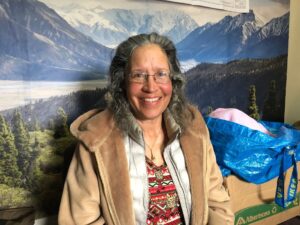
A woman living at Everyone Village – identified only as “Toni” for her privacy and safety – is one of the earliest residents working to find a new life off the city streets. [Credit: Brian Bull]
Toni said she has explored art more since coming to Everyone Village and settling into a pallet house. She said having a place to sleep has taken the stress off of finding a warm, dry space (“It feels like climbing Mt. Everest every day when you’re out there.”) She’s also appreciative of no longer dealing with “really intense” loneliness, and has been part of Pastor Gabe’s spiritual gatherings and helped other arrivals transition to the site.
“I could go any direction I want to now, where before I had to work on surviving,” she said. “I can actually dream and achieve dreams now where before it was like that’ll never happen.”
City officials have acknowledged there’s more work to be done, and more people to be housed. According to a Eugene Chamber of Commerce study released last September, 3115 people in Lane County were unhoused on Aug. 21, 2021. Of that, only 42 were moved into housing that same month.
And then there are those who object to models involving checkpoints and monitors, said the City of Eugene’s McIver.
“Sometimes there is pushback from folks who are concerned that some of the shelter sites are regulated in that way, because they believe that people should be able to have guests in and to be able to socialize in the place that they are living,” he said.
But he said there is a reason for the more restricted approach at Everyone Village.
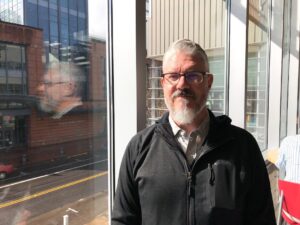
Kelly McIver, PIO for the City of Eugene’s Unhoused Response. [Credit: Brian Bull]
Old interests, new prospects
In a largely undeveloped tract of Everyone Village, Elizabeth Deffenbaugh walked towards a patch of space she’s made her own: a garden freshly-planted with radishes, salad greens, cauliflower, and sunflowers that she expects to grow up to ten feet tall. While she had previously worked at cannabis farm, she says it was repetitive work that wasn’t relaxing. For this garden, she plans to harvest and share the produce with fellow villagers. Flowers might be gathered and sold, but she’s still working out details with coordinators.
“We have an artichoke plant, it’s looking a little sad but it’s still alive,” she chuckled, wrapping her coat tightly as a smattering of fine hail falls across the path. When the skies clear, she points to a ring of red flags about ten feet away from her garden.
“We have a family of killdeer here that are nesting,” explained Deffenbaugh. A tan bird with a dart-like tail, saucer-like eyes, and a black and white banded neck hops nearby, keeping a close eye on her. “That’s probably the father. They have four eggs in there, and they’re raising their family right next to the garden.”
Deffenbaugh explained that this species of plover is very protective of their family. The killdeer glanced at us and began to hop away, as if beckoning us to follow.
“They have this broken wing thing they do to lure predators away from their nest. They’re smart.”
Into her fourth month at Everyone Village, Deffenbaugh is still getting situated with her new community. But she hopes one day to find long-term and stable housing, like an apartment of her own.
“Then I could start an at-home business and have more income to live off of because disability payments do not cover all the bills like the government thinks they do.”
For now, Deffenbaugh feels safe and is enjoying her responsibilities with the garden and the family of killdeer that are a protected species. As the clouds opened up, letting sunlight break across her garden space, she paused and explained that it’s also her quiet zone.
“Only positive thoughts and positive talk. It’s better for the people and plants that way.”
